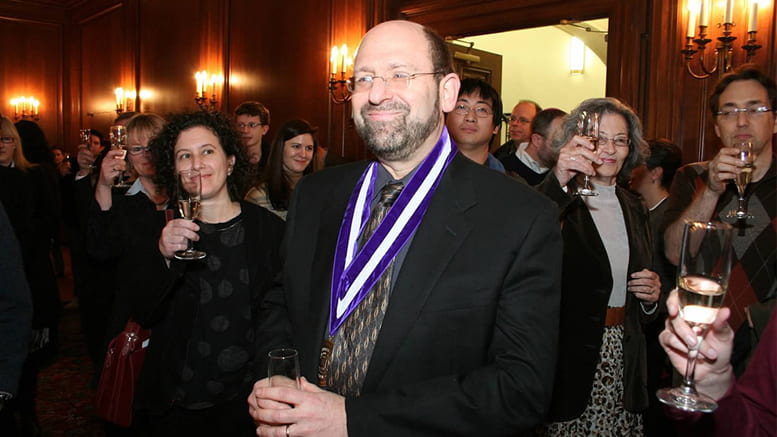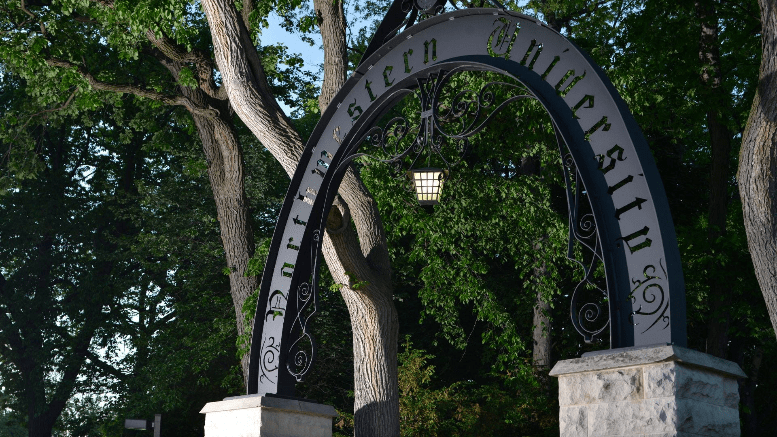Mathematics pioneer Steve Zelditch dies at 68
September 21, 2022

A founder of the field of quantum chaos remembered as an enthusiastic mathematician, colleague and teacher
Steven “Steve” Zelditch, the Wayne and Elizabeth Jones Professor of Mathematics at Northwestern University, died Sunday, Sept. 11, after a battle with cancer. He was 68.
Zelditch was considered one of the founders of the field of quantum chaos, which relates chaotic motion of the point particles of classical mechanics to the smearing-out of the corresponding quantum mechanical states. In the 1980s, he made a breakthrough on quantum ergodicity for Riemann surfaces, and his subsequent work made progress in and drew ideas from probability, string theory, general relativity, complex geometry, partial differential equations and spectral and scattering theory.
“Professor Zelditch was known as an enthusiastic and energetic teacher and mentor,” said Adrian Randolph, dean of Northwestern’s Weinberg College of Arts and Sciences. “He will be fondly remembered by his colleagues and students for his generosity and earnest passion for mathematics.”
“A giant in his field”
“Everybody who met Steve was struck by his incredible energy and enthusiasm for mathematics,” said Ben Weinkove, chair of the department of mathematics. “He was a giant in his field.”
Through his work, Zelditch sought to answer complicated questions. For example, when you listen to music, you can hear the difference between the low sound of a big bass drum and the higher sound of a small snare drum. But can you hear the shape of the drum?
He found that if you assume the head of the drum is convex, has no holes, has at least one mirror symmetry and a few other technical assumptions, then you can reconstruct the shape of the drum by listening to it. This discovery was one of the many impacts Zelditch had on mathematics.
Colleagues said he had a taste for problems involving asymptotic expansions, where a parameter in a problem becomes very large or very small, and random objects as proxies for hard-to-reach deterministic ones.
“Steve Zelditch is the one who made ‘quantum ergodicity’ a true field of mathematical research,” said Nalini Anantharaman, professor of mathematics at the Collège de France. “He gave the first complete proof of the theorem, then generalized it within all sorts of geometric contexts. He passionately shared with us all his ideas to prove quantum unique ergodicity. He was an endless source of ideas.”
Zelditch earned his bachelor’s degree from Harvard and his Ph.D. degree from the University of California, Berkeley. After postdoctoral positions at Columbia University; the University of California, Berkeley; and Massachusetts Institute of Technology (MIT), he joined the faculty at Johns Hopkins University, where he taught for 25 years before joining the department of mathematics at Northwestern in 2010.
He won the 2013 Stefan Bergman Prize for finding “deep and diverse relations between the Bergman kernel and many other areas, including complex geometry, probability and mathematical physics.” His work on the Bergman kernel included the celebrated Tian-Yau-Zelditch expansion in complex geometry. He also authored more than 180 publications.
He was an invited speaker at the International Congress of Mathematicians in Beijing in 2002. In 2013 he was named a fellow of the American Mathematical Society.
Above all else, Zelditch loved to talk mathematics.
“When news of his illness spread in the mathematical community, his colleagues quickly organized an online 69th birthday conference, with speakers from all over the world,” Weinkove said. “Characteristically, he was on the Zoom call until the day before his death, still eager to hear about the latest developments.”
Adviser and teacher
His colleagues, as well as current and former students, remember him fondly.
“Zelditch was especially supportive of younger researchers, and was an inspiring mentor,” said Jared Wunsch, professor of mathematics at Northwestern. “He loved to teach, and when it was time to decide who was teaching what, he would always end up having offered his services for about half the department’s classes.”
“My first encounter with him was at the chalkboard in front of his probability class presenting solutions to homework problems. I remember him tearing my solution apart until it was correct,” said current Ph.D. candidate Nicholas Lohr, who was a student of Zelditch’s. “The next week I was determined to do a better job, and, when I presented, he enjoyed my solution. He was not only an oracle of unparalleled wisdom, but, also, he was my selfless friend that I seemed to have known my whole life. It is an honor being his last student.”
Zelditch is survived by his wife, Ursula Porod, professor of instruction and associate department chair in Northwestern’s mathematics department, and their two sons, Benjamin and Phillip.
Faculty

Joel Mokyr wins Nobel Prize in Economic Sciences
October 13, 2025
Nobel recognizes Mokyr’s theory on sustained economic growth Joel Mokyr, the Robert H. Strotz Professor of Arts and Sciences and professor of economics and history in the Weinberg College of Arts and Sciences at Northwestern University, today (Oct….

Northwestern accelerates quantum research with NVIDIA technology
September 19, 2025
NVIDIA code could help researchers tackle computationally demanding tasks hindering quantum research Northwestern University physicists are using NVIDIA technology to tackle the computationally demanding tasks hindering quantum research. Northwestern theoretical physicist Jens Koch and his research group…

Weinberg College welcomes new faculty members for 2025-2026 academic year
September 18, 2025
Shreeya Behera Assistant Professor of Instruction PhD institution: The Ohio State University Previous title and institution: Data Scientist at Pandora Bio, Inc. Home department: Statistics and Data Science Shreeya Behera is a mathematician and data…

Weinberg College faculty and graduate students recognized for excellence in teaching
July 2, 2025
Each year, the Weinberg College of Arts and Sciences and the Office of the Provost recognizes members of the College’s tenure-line and teaching-track faculty for excellence in teaching. Weinberg College in addition recognizes the contributions…



